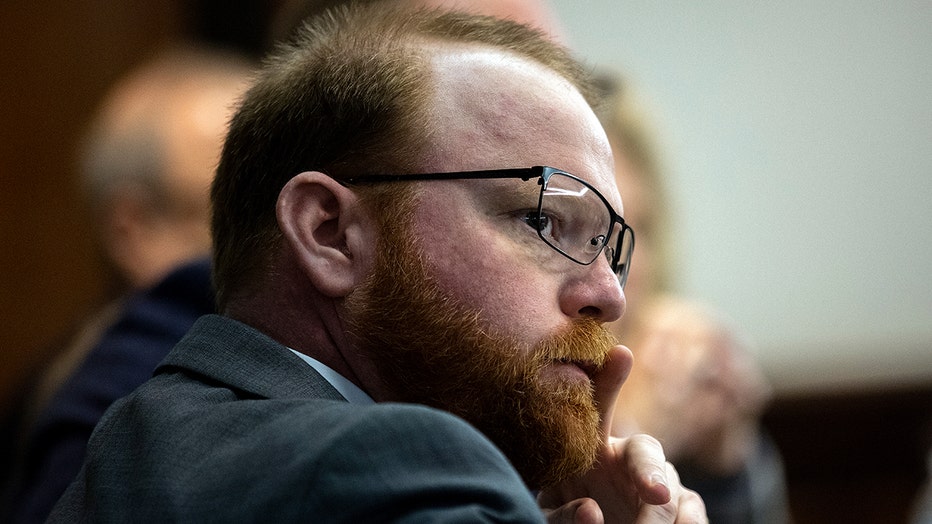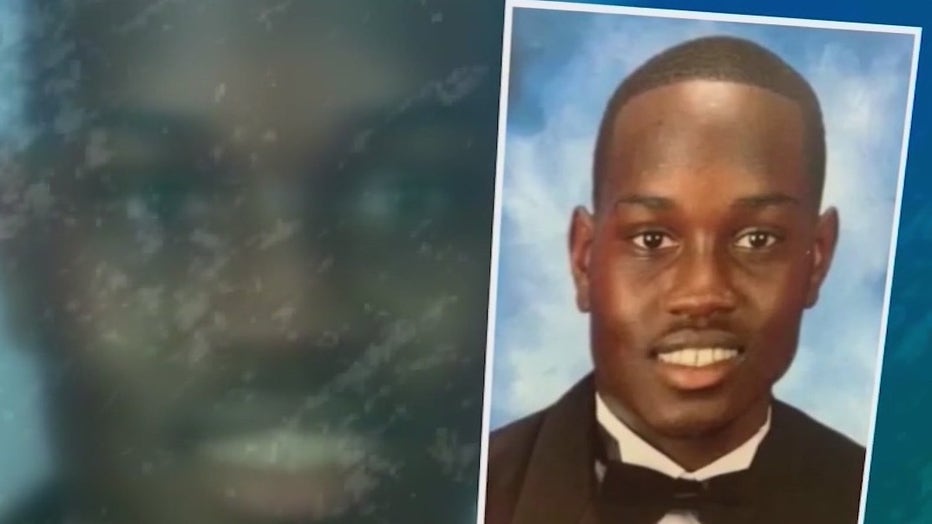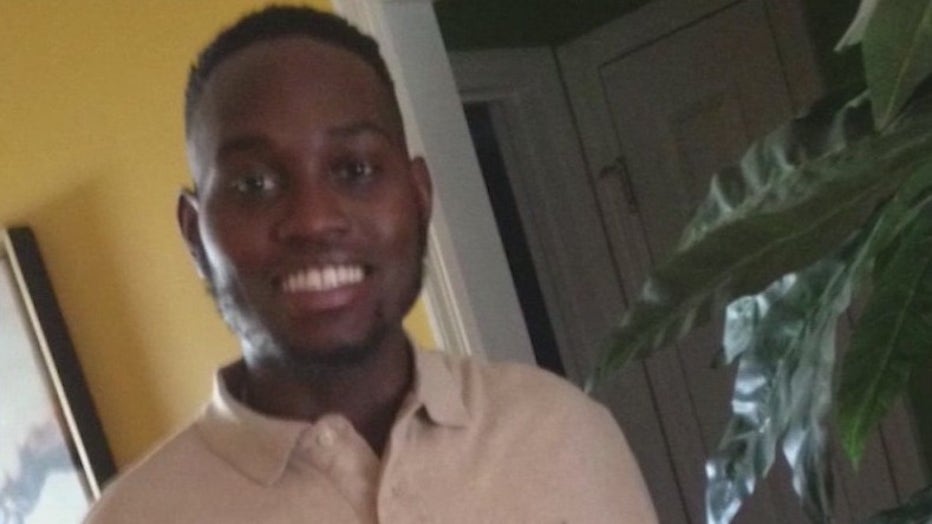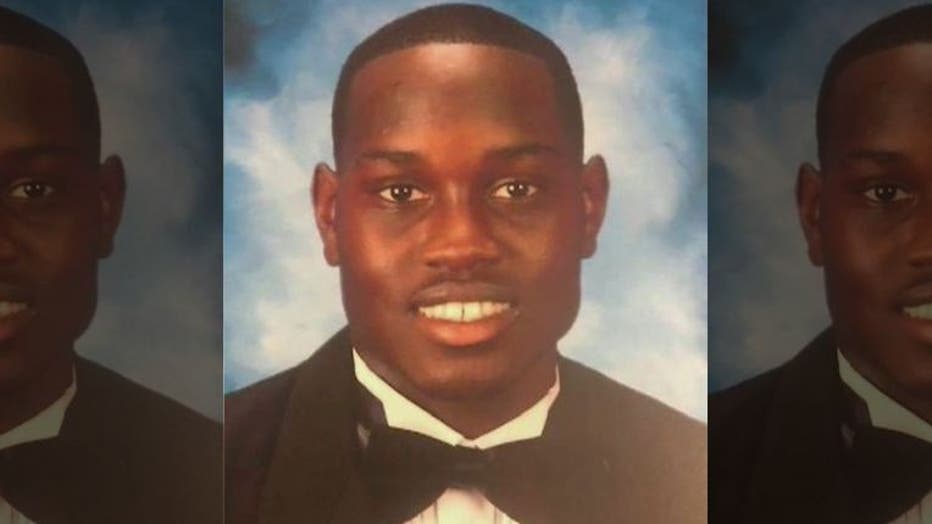Men convicted of Ahmaud Arbery’s murder sentenced to life in prison

Judge sentences three men convicted in murder of Ahmaud Arbery
Greg McMichael and Travis McMichael were sentenced to live without parole plus 20 years and William 'Roddie' Bryan was sentenced to life with the possibility of parole for their part in the murder of Ahmaud Arbery.
ATLANTA - Father and son Greg and Travis McMichael were sentenced to life in prison without the possibility of parole while William "Roddie" Bryan was sentenced to life in prison with the possibility of parole.
All three men were found guilty of murder and other crimes in the Feb. 23, 2020 killing of Arbery. Bryan recorded cellphone video of Travis McMichael blasting the 25-year-old Black man with a shotgun after Arbery spent several minutes running as the three men chased him in pickup trucks.
"Ahmaud Arbery was hunted down and shot, and he was killed because individuals here in the courtroom took the law into their own hands," the judge said.

Family of Ahmaud Arbery gives emotional testimony
Wanda Cooper-Jones, the mother of Ahmaud Arbery, was just one of the many members of the family to testify at the sentencing hearing for the three men convicted of killing him.
Before sentencing, Walmsley paused for a minute of silence to help give the scope of what those five minutes must have been like for Arbery.
"When I thought about this, I thought from a lot of different angles. I kept coming back to the terror that must have been in the mind of the young man running through Satilla Shores," he said, mentioning the neighborhood outside the port city of Brunswick where Arbery was killed.
Ahmaud Arbery’s family asked a judge to show no lenience Friday in sentencing three white men convicted of murder for chasing the running Black man in pickup trucks, cutting off his escape and fatally blasting him with a shotgun.
"These are the qualities that made these men assume that Ahmaud was a dangerous criminal and chase them with guns drawn. To me, those qualities reflect a young man full of life and energy who looked like me and the people I loved," Jasmine Arbery said.
At the start of the hearing, Superior Court Judge Timothy Walmsley rejected last-minute legal motions by Bryan’s defense attorney to throw out his murder conviction and spare Bryan from the life sentence that state law imposes automatically.

Sentencing hearing for men convicted in Ahmaud Arbery murder
The three men convicted in the murder of Ahmaud Arbery will face a judge for sentencing after the first of the year according to an order filed in the Superior Court of Glynn County.
A nine-count indictment charged the McMichaels and Bryan each with one count of malice murder, four counts of felony murder, two counts of aggravated assault, one count of false imprisonment, and one count of criminal attempt to commit false imprisonment.
Travis McMichael, 35, was convicted of all nine charges. Greg McMichael, 65, was convicted of all charges except malice murder. Bryan, 52, was convicted of three counts of felony murder and one count of aggravated assault, as well as false imprisonment and criminal attempt to commit false imprisonment.
Arbery’s mother asked for the maximum sentence, saying she suffered a personal, intense loss made worse by a trial where the men’s defense was that Arbery made bad choices that led to his death.
"This wasn’t a case of mistaken identity or mistaken fact. They chose to target my son because they didn’t want him in their community. They chose to treat him differently than other people who frequently visited their community," Wanda Cooper-Jones said. "And when they couldn’t sufficiently scare or intimidate him, they killed him."

Prosecution team talks about Ahmaud Arbery trial
Senior Assistant District Attorney Linda Dunikoski, Assistant District Attorney Larissa Ollivierre, and Senior Assistant District Attorney Paul Camarillo sit down with FOX 5 to discuss the prosecution of Travis McMichael, Greg McMichael, and William Roddie Bryan in the murder of Ahmaud Arbery.
Prosecutor Linda Dunikoski asked the judge for life without parole for Travis and Greg McMichael and the possibility of parole for Bryan. But she said all deserved that mandatory life sentence for showing "no empathy for the trapped and terrified Ahmaud Arbery."
Whether the judge grants parole, either choice amounts to a stiff sentence. Even if the judge allows a possibility of parole, the McMichaels and Bryan will have to serve at least 30 years in prison first.
MALICE MURDER VS. FELONY MURDER: A LOOK AT THE AHMAUD ARBERY MURDER TRIAL CHARGES

Defendant Travis McMichael watches a video clip the jury asked to see as part of their deliberation during the trial of McMichel and his son, Travis McMichael, and a neighbor, William "Roddie" Bryan in the Glynn County Courthouse on November 24, 2021
Malice and felony murder convictions both carry a minimum penalty of life in prison. The judge decides whether that comes with or without the possibility of parole. Even if a chance of parole is granted, a person convicted of murder must serve 30 years before becoming eligible. Multiple murder convictions are merged for the purposes of sentencing.
Murder can also be punishable by death in Georgia if the killing meets certain criteria. Prosecutors chose not to seek the death penalty in the case of Arbery’s slaying.
Each count of aggravated assault carries a prison term of at least one year but not more than 20 years. False imprisonment is punishable by a sentence of one to 10 years in prison.

Greg McMichael sits with his attorney before the start of closing arguments to the jury during the trial of Ahmaud Arbery's alleged killers at Glynn County Superior Court. (Photo by Stephen B. Morton-Pool/Getty Images)
'IT'S POSSIBLE EVERYWHERE': PROSECUTION TEAM TALKS GETTING JUSTICE FOR AHMAUD ARBERY
Once the defendants were sentenced they have 30 days to file a motion for a new trial.
All three men still face a federal hate crime charge, which will is scheduled to go to trial in February. A pretrial motion hearing is scheduled for Dec. 20 on those federal charges.
A judge has scheduled jury selection in the federal trial to begin Feb. 7. The McMichaels and Bryan pleaded not guilty to the hate crime charges in May.
Who was Ahmaud Arbery?

Death of Ahmaud Arbery
He was at a crossroads, his life stretching out before him, his troubles largely behind him. He had enrolled at South Georgia Technical College, preparing to become an electrician, just like his uncles. But first, he decided, he would take a break. College could wait until the fall.
To help keep his head clear, he ran, just about every day. Off he’d go, out of the doors of his mother’s house, down the long street toward Fancy Bluff Road. Then would come the right turn onto the two-lane road lined by oak trees draped with Spanish moss.
About a mile and a half into his usual route, Ahmaud Arbery would cross the four lanes of Jekyll Island Causeway into the subdivision of Satilla Shores.

Still from a video showing Ahmaud Arbery jogging through a Brunswick neighborhood moments before he was shot and killed on Feb. 23, 2020.
AHMAUD ARBERY MURDER TRIAL: JURY FINDS 3 DEFENDANTS GUILTY OF MURDER
On Feb. 23, 2020 — at the age of 25 — he ran through Satilla Shores for the final time.
That day, Arbery was shot to death by a father and son who told police they grabbed guns and pursued him in a pickup truck because they believed he was responsible for break-ins in their neighborhood — a Black man, killed by two white men.
Three months later, a makeshift memorial of flowers rested on the lawn of a house near where he died, along with a plaque reading, "It’s hard to forget someone who gave us so much to remember."
Before Arbery’s name joined a litany of hashtags bearing young Black men’s names, he was a skinny kid whose dreams of an NFL career didn’t pan out. Those who knew him speak of a seemingly bottomless reservoir of kindness he used to encourage others, of an easy smile and infectious laughter that could lighten just about any situation.
TRIO GUILTY OF KILLING AHMAUD ARBERY. WHAT NOW?
They also acknowledge the legal troubles that cropped up after high school — five years of probation for carrying a gun onto the high school campus in 2013, a year after graduation, and shoplifting from a Walmart store in 2017, a charge that extended that probation up until the time of his death.
In his final months on Earth, Arbery appeared to be someone who felt on the verge of personal and professional breakthroughs, especially because his probation could have ended that year, many of those close to him told The Associated Press.
AHMAUD ARBERY MURDER TRIAL: REACTION TO GUILTY VERDICT FLOODS SOCIAL MEDIA
His mother, Wanda Cooper-Jones, accepted that he was a young adult living at home, like so many of his contemporaries, taking a breather to chart how he’d one day support himself.
She had one rule: "If you have the energy to run the roads, you need to be on the job."
So he worked at his father’s car wash and landscaping business, and previously had held a job at McDonald’s.
Born May 8, 1994, Ahmaud Marquez Arbery was the youngest of three children, answering to the affectionate nicknames "Maud" and "Quez."
As a teenager, he stuck to the family home so markedly that his family worried he never wanted to go out with friends. "And I was like, he’ll get to the stage eventually," Cooper-Jones said. "He was a mama’s boy at first."
As his mother predicted, that reserve was left behind when Arbery entered Brunswick High School’s Class of 2012.
He took cues from his brother, Marcus Jr., and tried out for the Brunswick Pirates football team. His slender build certainly didn’t make him a shoo-in for linebacker on the junior varsity squad, said Jason Vaughn, his former coach and a U.S. history teacher at the school.
"As soon as practice started and Ahmaud started to really go, oh man, his speed was amazing," Vaughn recalled with a laugh. "He was undersized, but his heart was huge."
AHMAUD ARBERY'S FAMILY REACTS TO GUILTY VERDICTS: 'I NEVER THOUGHT THIS DAY WOULD COME'
Off the field, Ahmaud had a talent for raising the spirits of the people around him — and a penchant for imitating his coach, Vaughn said.
"If I was standing in the hallway, kind of looking mean or having a bad day — maybe my lesson plan didn’t go right — Maud could kind of sense that about me," Vaughn said. "He’d come stand beside me and be like, ‘I’m Coach Vaughn today. Y’all keep going to class. Hurry up, hurry up! Don’t be tardy! Don’t be late!’ That’s what I loved about him. He was always trying to make people smile."

Ahmaud Arbery (Family photo)
"Some students it’s hard to get mad at," he said, "because you love them so much."
At the end of his final football season, no college recruiters tried to woo No. 21. But Arbery’s high school football career still finished on a high note, his mother remembers.
In his final game, he intercepted a pass and ran the ball back to score a touchdown. A referee threw a flag on the play, but his mother insisted that his accomplishment still mattered: "I said, ‘Guess what, son? You did it!’ And he was very, very excited about it. That was a very good moment for us."
Former teammate Demetrius Frazier grew up just down the street from the Arberys, and his friendship with Ahmaud dated back to their days in a local pee-wee football program.
Frazier treasures their quieter moments in high school — just two friends playing video games, shooting hoops, wolfing down peanut butter and jelly sandwiches, hot dogs and chips.

Those were the times his friend seemed happiest, Frazier said, before his legal troubles bogged him down.
Frazier went on to play wide receiver for Middle Tennessee State University’s football team and now holds down an office job and is raising a son in nearby Darien, Georgia.
Arbery’s own football aspirations had been dashed, but he still wanted so much for himself, Frazier said.
"Ahmaud was just ready to put himself in a position to be where he wanted to be in life," he said. "That’s what they took from him."
MALICE MURDER VS. FELONY MURDER: A LOOK AT THE AHMAUD ARBERY MURDER TRIAL CHARGES
Less than two weeks before Arbery was killed, 34-year-old Travis McMichael had called 911 to report a possible trespasser inside a house under construction in the subdivision, describing him as "a Black male, red shirt and white shorts" and saying he feared the person was armed.
The Arbery family’s attorneys have confirmed that Ahmaud was captured on security cameras entering that home on the day he was killed. The property owner said nothing appeared to have been stolen, however, and surveillance footage also shows other people coming in and out of the construction site on other days, some apparently to access a water source on the property.
Travis McMichael and his 64-year-old father Gregory McMichael — a former police officer and retired investigator for the Glynn County district attorney — were charged with murder and aggravated assault on May 7, 2020, a day before Arbery would have turned 26.
Their arrests were sought by state law enforcement authorities after cellphone video of the shooting taken by another man at the scene was released to a local radio station. Gregory McMichael told police that Arbery attacked his son and then was shot in a struggle over Travis’ shotgun.

On May 21, 2020, state authorities arrested the man who filmed Arbery’s killing, William "Roddie" Bryan Jr., on charges of felony murder and criminal attempt to commit false imprisonment.
For Arbery’s family, the pain of his loss is magnified by his final moments being captured on video.
"I didn’t want to watch it. I didn’t want my children to watch anything like that, to see their brother get killed," said Ahmaud’s father, Marcus Arbery Sr., who noted that at least one of Ahmaud’s siblings viewed the footage. "My daughter, she called me and broke down crying. They just turned my family upside down."
Cooper-Jones has said she believes her son was simply out for a jog when he encountered the men who had profiled him as a burglar. Their rush to judgment speaks to a larger problem of bias against young Black men and boys, she said.
"I think that when he went into the property, he probably was looking to see how they were going to run the wire … or how he would do the job if it was one of his assignments," she said, referring to his plan to become an electrician.
Lee Merritt, one of the Arbery family’s civil rights attorneys, said the circumstances of Ahmaud’s life touch on something deeper about American society.
"Our ravenous criminal justice system tends to take young Black men in their teenage years, introduces them to the system and never lets them out again," he said. But when Ahmaud died, "he was at a point of transition."
His death will not be in vain, his sister told a crowd of supporters during a May 2020 rally calling for justice that was held at the historic Glynn County courthouse in Brunswick. Many attendees had driven hours from Atlanta to be there.
"I like to believe that our lives are already planned out before we even take our first steps," Jasmine Arbery said. "I hate to feel like he was sacrificed, but that’s how I feel."
A caravan of predominantly Black car and motorcycle club members retraced Ahmaud’s running route to Satilla Shores. People riding in freshly waxed and polished Corvettes and Dodges laid flowers at the shooting scene.
Gazing at the tributes later that night, Cooper-Jones said she does not doubt that she raised her son right. As a mom, she had been a stickler; she knows that.
On May 10, 2020, she celebrated her first Mother’s Day without her youngest child. Thinking about a greeting card he’d given her for the occasion two years earlier made her smile.
"We don’t see eye to eye, but I love you," she recalled Ahmaud writing. "That tells me, I had just got on his butt about something that he did."
Ultimately, she said, nothing her son did in his short life justifies the way he died.
"I will get answers — that was my promise," she said. "That’s the last thing that I told him, on the day of his funeral, that Mama will get to the bottom of it."
WATCH: FOX 5 NEWS LIVE COVERAGE
The Associated Press contributed to this report

